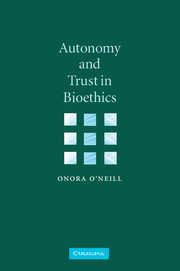Book contents
- Frontmatter
- Contents
- Preface
- Frontispiece
- 1 Gaining autonomy and losing trust?
- 2 Autonomy, individuality and consent
- 3 ‘Reproductive autonomy’ and new technologies
- 4 Principled autonomy
- 5 Principled autonomy and genetic technologies
- 6 The quest for trustworthiness
- 7 Trust and the limits of consent
- 8 Trust and communication: the media and bioethics
- Bibliography
- Institutional bibliography
- Index
7 - Trust and the limits of consent
Published online by Cambridge University Press: 06 November 2009
- Frontmatter
- Contents
- Preface
- Frontispiece
- 1 Gaining autonomy and losing trust?
- 2 Autonomy, individuality and consent
- 3 ‘Reproductive autonomy’ and new technologies
- 4 Principled autonomy
- 5 Principled autonomy and genetic technologies
- 6 The quest for trustworthiness
- 7 Trust and the limits of consent
- 8 Trust and communication: the media and bioethics
- Bibliography
- Institutional bibliography
- Index
Summary
THE ‘CASSANDRA PROBLEM’
It was Cassandra's misfortune that her prophecies were trustworthy, but still she was not trusted. Her problem is also ours. We note only one side of the crisis of trust in medicine, science and biotechnology if we concentrate only on examples of misplaced trust. The other side of the problem, from which Cassandra suffered, is that of misplaced mistrust, unwarranted suspicion and misjudged refusal to trust, even where there is adequate – if inevitably imperfect – evidence of trustworthiness.
Cassandra's problem is neither the best, nor the worst of life's possibilities. Trust placed unsuspectingly in untrustworthy agents and institutions that deceive and betray that trust is worse. Yet mistrust directed inaccurately at trustworthy persons and institutions also leads to unnecessary anxiety (for the needlessly mistrusting) and to grief and difficulties (for the needlessly mistrusted).
Since there are never guarantees that doctors or scientists, health services or business, public officials or environmental campaigners, will always be trustworthy, there is always some risk that trust may be misdirected. Would it not then be sensible to place no trust? This approach sounds simple, but as we have seen there is no reason to think that scepticism or suspicion will always be more reasonable or safer than trust, or even that will always be feasible. Blanket scepticism may sound more sophisticated than blanket credulity, but has no more to commend it; blanket suspicion is no more reasonable or feasible than blanket trust.
- Type
- Chapter
- Information
- Autonomy and Trust in Bioethics , pp. 141 - 164Publisher: Cambridge University PressPrint publication year: 2002
- 2
- Cited by



